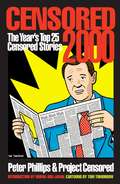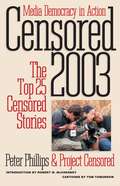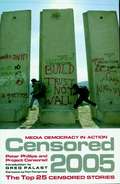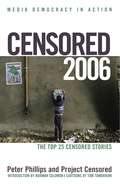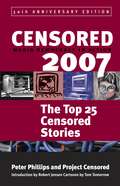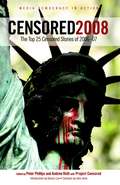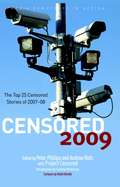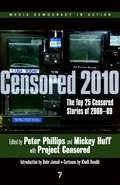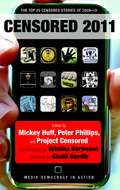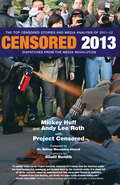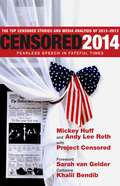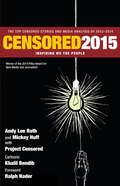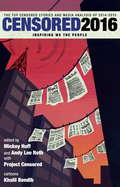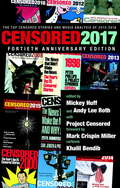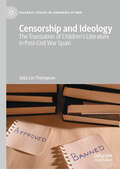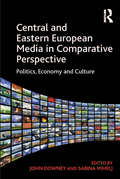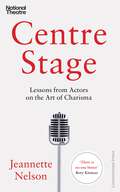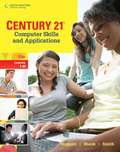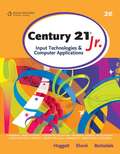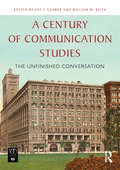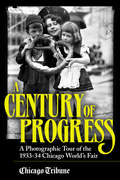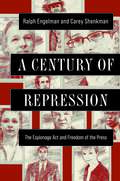- Table View
- List View
Censored 2000: The Year's Top 25 Censored Stories
by Peter Phillips Project Censored Mumia Abu-Jamal Tom TomorrowThe yearly volumes of Censored, in continuous publication since 1976 and since 1995 available through Seven Stories Press, is dedicated to the stories that ought to be top features on the nightly news, but that are missing because of media bias and self-censorship. The top stories are listed democratically in order of importance according to students, faculty, and a national panel of judges. Each of the top stories is presented at length, alongside updates from the investigative reporters who broke the stories.Beyond the Top 25 stories, additional chapters delve further into timely media topics: The Censored News and Media Analysis section provides annual updates on Junk Food News and News Abuse, Censored Déjà Vu, signs of hope in the alternative and news media, and the state of media bias and alternative coverage around the world. In the Truth Emergency section, scholars and journalists take a critical look at the US/NATO military-industrial-media empire. And in the Project Censored International section, the meaning of media democracy worldwide is explored in close association with Project Censored affiliates in universities and at media organizations all over the world.A perennial favorite of booksellers, teachers, and readers everywhere, Censored is one of the strongest life signs of our current collective desire to get the news we citizens need--despite what Big Media tells us.
Censored 2003: The Top 25 Censored Stories
by Robert W. Mcchesney Peter Phillips Project Censored Tom TomorrowThe yearly volumes of Censored, in continuous publication since 1976 and since 1995 available through Seven Stories Press, is dedicated to the stories that ought to be top features on the nightly news, but that are missing because of media bias and self-censorship. The top stories are listed democratically in order of importance according to students, faculty, and a national panel of judges. Each of the top stories is presented at length, alongside updates from the investigative reporters who broke the stories.
Censored 2005: The Top 25 Censored Stories
by Greg Palast Peter Phillips Project Censored Tom TomorrowThe yearly volumes of Censored, in continuous publication since 1976 and since 1995 available through Seven Stories Press, is dedicated to the stories that ought to be top features on the nightly news, but that are missing because of media bias and self-censorship. The top stories are listed democratically in order of importance according to students, faculty, and a national panel of judges. Each of the top stories is presented at length, alongside updates from the investigative reporters who broke the stories.
Censored 2006: The Top 25 Censored Stories
by Norman Solomon Peter Phillips Project Censored Tom TomorrowThe yearly volumes of Censored, in continuous publication since 1976 and since 1995 available through Seven Stories Press, is dedicated to the stories that ought to be top features on the nightly news, but that are missing because of media bias and self-censorship. The top stories are listed democratically in order of importance according to students, faculty, and a national panel of judges. Each of the top stories is presented at length, alongside updates from the investigative reporters who broke the stories.
Censored 2007: The Top 25 Censored Stories
by Peter Phillips Project Censored Tom Tomorrow Robert JensenThe yearly volumes of Censored, in continuous publication since 1976 and since 1995 available through Seven Stories Press, is dedicated to the stories that ought to be top features on the nightly news, but that are missing because of media bias and self-censorship. The top stories are listed democratically in order of importance according to students, faculty, and a national panel of judges. Each of the top stories is presented at length, alongside updates from the investigative reporters who broke the stories.
Censored 2008: The Top 25 Censored Stories of 2006-07
by Dennis Loo Peter Phillips Project Censored John Jonik Andrew RothThe yearly volumes of Censored, in continuous publication since 1976 and since 1995 available through Seven Stories Press, is dedicated to the stories that ought to be top features on the nightly news, but that are missing because of media bias and self-censorship. The top stories are listed democratically in order of importance according to students, faculty, and a national panel of judges. Each of the top stories is presented at length, alongside updates from the investigative reporters who broke the stories.
Censored 2009: The Top 25 Censored Stories of 2007-08
by Peter Phillips Khalil Bendib Project Censored Andrew Roth Cynthia MckinneyThe yearly volumes of Censored, in continuous publication since 1976 and since 1995 available through Seven Stories Press, is dedicated to the stories that ought to be top features on the nightly news, but that are missing because of media bias and self-censorship. The top stories are listed democratically in order of importance according to students, faculty, and a national panel of judges. Each of the top stories is presented at length, alongside updates from the investigative reporters who broke the stories.
Censored 2010: The Top 25 Censored Stories of 2008-09
by Peter Phillips Dahr Jamail Khalil Bendib Project Censored Mickey HuffThe yearly volumes of Censored, in continuous publication since 1976 and since 1995 available through Seven Stories Press, is dedicated to the stories that ought to be top features on the nightly news, but that are missing because of media bias and self-censorship. The top stories are listed democratically in order of importance according to students, faculty, and a national panel of judges. Each of the top stories is presented at length, alongside updates from the investigative reporters who broke the stories.
Censored 2011: The Top 25 Censored Stories of 2009 - 10
by Peter Phillips Kristina Borjesson Khalil Bendib Project Censored Mickey HuffThe yearly volumes of Censored, in continuous publication since 1976 and since 1995 available through Seven Stories Press, is dedicated to the stories that ought to be top features on the nightly news, but that are missing because of media bias and self-censorship. The top stories are listed democratically in order of importance according to students, faculty, and a national panel of judges. Each of the top stories is presented at length, alongside updates from the investigative reporters who broke the stories.
Censored 2013: The Top Censored Stories and Media Analysis of 2011-2012
by Khalil Bendib Project Censored Mickey HuffEvery year since 1976, Project Censored, our nation's oldest news-monitoring group--a university-wide project at Sonoma State University founded by Carl Jensen, directed for many years by Peter Phillips, and now under the leadership of Mickey Huff--has produced a Top-25 list of underreported news stories and a book, Censored, dedicated to the stories that ought to be top features on the nightly news, but that are missing because of media bias and self-censorship.Seven Stories Press has been publishing this yearbook since 1994, featuring the top stories listed democratically in order of importance according to students, faculty, and a national panel of judges. Each of the top stories is presented at length, alongside updates from the investigative reporters who broke the stories.Beyond the Top-25 stories, additional chapters delve further into timely media topics: The Censored News and Media Analysis section provides annual updates on Junk Food News and News Abuse, Censored Deja Vu, signs of hope in the alternative and news media, and the state of media bias and alternative coverage around the world. In the Truth Emergency section, scholars and journalists take a critical look at the US/NATO military-industrial-media empire. And in the Project Censored International section, the meaning of media democracy worldwide is explored in close association with Project Censored affiliates in universities and at media organizations all over the world.A perennial favorite of booksellers, teachers, and readers everywhere, Censored is one of the strongest life signs of our current collective desire to get the news we citizens need--despite what Big Media tells us.
Censored 2014: Fearless Speech in Fateful Times; The Top Censored Stories and Media Analysis of 2012-13
by Khalil Bendib Project Censored Mickey Huff Sarah Van Gelder Andy Lee RothEvery year since 1976, Project Censored, our nation's oldest news-monitoring group--a university-wide project at Sonoma State University founded by Carl Jensen, directed for many years by Peter Phillips, and now under the leadership of Mickey Huff--has produced a Top-25 list of underreported news stories and a book, Censored, dedicated to the stories that ought to be top features on the nightly news, but that are missing because of media bias and self-censorship. Seven Stories Press has been publishing this yearbook since 1994, featuring the top stories listed democratically in order of importance according to an international panel of judges. Beyond the Top-25 stories, additional chapters delve further into timely media topics: The Censored News and Media Analysis section provides annual updates on Junk Food News and News Abuse, Censored Deja Vu, signs of hope in the alternative and news media, and the state of media bias and alternative coveragearound the world. In the Truth Emergency section, scholars and journalists take a critical look at the US/NATO military-industrial-media empire. And in the Project Censored International section, the meaning of media democracy worldwide is explored in close association with Project Censored affiliates in universities and at media organizations all over the world.A perennial favorite of booksellers, teachers, and readers everywhere, Censored is one of the strongest lifesigns of our current collective desire to get the news we citizens need--despite what Big Media tells us.
Censored 2015
by Ralph Nader Khalil Bendib Project Censored Mickey Huff Andy Lee RothEvery year since 1976, Project Censored, our nation's oldest news-monitoring group--a university-wide project at Sonoma State University founded by Carl Jensen, directed for many years by Peter Phillips, and now under the leadership of Mickey Huff--has produced a Top-25 list of underreported news stories and a book, Censored, dedicated to the stories that ought to be top features on the nightly news, but that are missing because of media bias and self-censorship.A perennial favorite of booksellers, teachers, and readers everywhere, Censored is one of the strongest life-signs of our current collective desire to get the news we citizens need--despite what Big Media tells us.From the Trade Paperback edition.x havens. . . . And so much more that didn't make the front page (or even back page). Informative and timely, appalling and sometimes uplifting, Censored alerts readers to the stories that were quashed in favor of media bias, celebrity scandals, and self-censorship, in hopes that we the people, armed with knowledge, put our bodies upon the gears--before it's too late.From the Trade Paperback edition.
Censored 2016
by Project Censored Mickey Huff Andy Lee RothThe annual yearbook from Project Censored features the year's most underreported news stories, striving to unmask censorship, self-censorship, and propaganda in corporate-controlled media outlets. Censored 2016 features the top-25 most underreported stories, as voted by scholars, journalists, and activists across the country and around the world, as well as chapters exploring timely issues from the previous year with more in-depth analysis.
Censored 2017
by Andy Lee Roth Khalil Bendib Mickey Huff Project CensoredThe annual yearbook from Project Censored features the year's most underreported news stories, striving to unmask censorship, self-censorship, and propaganda in corporate-controlled media outlets. Featuring the top 25 most underreported stories, as voted by scholars, journalists, and activists across the country and around the world, as well as chapters exploring timely issues from the previous year with more in-depth analysis.From the Trade Paperback edition.
Censored 2018: The Top Censored Stories and Media Analysis of 2016-2017
by Mickey Huff Andy Lee Roth Project Censored Khalil Bendib"[Censored] should be affixed to the bulletin boards in every newsroom in America. And, perhaps, read aloud to a few publishers and television executives."--RALPH NADERThe annual yearbook from Project Censored features the year's most underreported news stories, striving to unmask censorship, self-censorship, and propaganda in corporate-controlled media outlets. Featuring the top 25 most underreported stories, as voted by scholars, journalists, and activists across the country and around the world, as well as chapters exploring timely issues from the previous year with more in-depth analysis.
Censorship and Ideology: The Translation of Children's Literature in Post-Civil War Spain (Palgrave Studies in Languages at War)
by Julia Lin ThompsonThis book offers a fascinating picture of how state censorship affected children’s literature translation in post-Civil War Spain. Focusing on the Spanish translations of Mark Twain’s children’s classics The Adventures of Tom Sawyer and The Adventures of Huckleberry Finn, the author traces the evolution of the censorship system of the Francoist regime and its impact on Spanish children’s literature during the years after the Spanish Civil War. Drawing on the regime’s censorship laws, official censors’ records, and textbooks, she not only examines the censorship imposed on the translations of Twain’s works, but also offers insights into the intricate connections between state censorship and the regime’s educational aims. The book gives a revealing analysis of the ways in which the highly bureaucratic censorship apparatus operated under Franco’s dictatorship, outlining the flaws and fallacies within it, as well as the strategies adopted by publishers and translators to resist the power of the state. While centred on Francoist Spain, the book also explores broader themes of ideology, censorship, and translation, making it a valuable source for scholars of translation studies and Hispanic studies, as well as those with a wider interest in literature, history, and cultural studies.
Censorship, Inc.: The Corporate Threat to Free Speech in the United States
by Lawrence SoleyThe First Amendment of the U.S. Constitution is a landmark in the defense of free speech against government interference and suppression. In this book we come to see how it also acts as a smokescreen behind which a more dangerous and insidious threat to free speech can operate. Soley shows how as corporate power has grown and come to influence the issues on which ordinary Americans should be able to speak out, so new strategies have developed to restrict free speech on issues in which corporations and property-owners have an interest. Censorship, Inc. is a comprehensive examination of the vast array of corporate practices which restrict free speech in the United States today in fields as diverse as advertsing and the media, the workplace, community life, and the environment. Soley also shows how these threats to free speech have been resisted by activism, legal argument, and through legislation. Grounded in extensive research into actual cases, this book is at the same time a challenge to conventional thinking about the nature of censorship and free speech.
Central and Eastern European Media in Comparative Perspective: Politics, Economy and Culture
by Sabina MiheljAppearing more than twenty years after the revolutions in Central and Eastern Europe, this book could not have come at a more appropriate time; a time to take stock not only of the changes but also the continuities in media systems of the region since 1989. To what extent are media institutions still controlled by political forces? To what extent are media markets operating in Central and Eastern Europe? Do media systems in Central and Eastern Europe resemble media systems in other parts of Europe? The answers to these questions are not the same for each country in the region. Their experience is not homogeneous. An international line up of distinguished experts and emerging scholars methodically examine the different economic, political, cultural, and transnational factors affecting developments in media systems across Central and Eastern Europe. Whereas earlier works in the media system tradition have, in the main, adopted the political framework of comparative politics, the authors argue that media systems are also cultural and economic institutions and there are other critical variables that might explain certain outcomes better. Topics discussed range from political economy to gender inequality to the study of ethno-cultural diversity. This unmatched volume gives you the unique opportunity to study the growing field of comparative media analysis across Eastern and Western Europe. A valuable resource that goes beyond the field of media and cultural analysis which media scholars as well as to area specialists should not go without!
Centre Stage: Lessons from Actors on the Art of Charisma
by Jeannette NelsonHow the world’s best actors communicate with gravitas – and how you can, too.‘The theatre stars’ voice guru’ Daily MailActing is all about charisma. Whether you’re an A-list star or an extra, when you’re on stage you need to perform in a way that makes your audience listen.That stage presence is something we can all learn from. Every time you speak up in a meeting, recount an anecdote, or tell a joke, it’s essential to communicate with gravitas.Jeannette Nelson knows a thing or two about gravitas. As Head of Voice at the National Theatre, she has spent three decades working with the world’s leading actors – from Al Pacino to Benedict Cumberbatch to Juliette Binoche – teaching them to speak clearly and move confidently.Now, Nelson pulls back the curtain on the tricks that professional performers use to own the room. Starting with clear speech and good posture, before moving on to the art of rhetoric and overcoming stage fright, she outlines a holistic three-stage method to communicating with authority, authenticity and eloquence. Throughout, she peppers the book with stories of how world-renowned actors learnt to make themselves heard – and how you can, too.The result is a fascinating and eminently practical guide to the art of performance. If all the world’s a stage, then this book will turn you into its lead actor.
Century 21® Computer Skills and Applications, Lessons 1–90
by Jack P. Hoggatt Jon A. Shank James R. SmithProvide your students with the best in keyboarding education from the proven keyboarding leader--now stronger than ever! This latest edition of CENTURY 21 COMPUTER SKILLS AND APPLICATIONS helps students prepare for a lifetime of keyboarding and computer success with innovative solutions updated to reflect today's business challenges. Students tap into the latest keyboarding technology, learn to master computer applications using Microsoft Office 2010/2013, and increase communication skills with relevant activities throughout this best-selling text. Trust the leader who has taught more than 85 million people to type--bringing 100 years of publishing experience and a century of innovations together in a complete line of keyboarding solutions.
Century 21® Jr., Input Technologies & Computer Applications
by Jack P. Hoggatt Jon A. Shank Karl BarksdaleLooking for a solution to get your students started in the computer world? This introductory text, CENTURY 21, JR. INPUT TECHNOLOGIES AND COMPUTER APPLICATIONS, 2e is the perfect companion for navigation of computer basics, file management, the Internet, keyboarding, handwriting recognition, speech recognition, tablet PCs, word processing, desktop publishing, spreadsheets, presentations, databases, HTML programming, and Web pages. CENTURY 21, JR. provides step-by-step guidance, with engaging activities labeled as Learn, Practice, and Apply. Units are divided into easy-to-manage chapters and projects will help students learn the features of Microsoft Office 2007.
A Century of Chinese Literature in Translation: English Publication and Reception (Routledge Advances in Translation and Interpreting Studies)
by Leah Gerber; Lintao QiThis book delves into the Chinese literary translation landscape over the last century, spanning critical historical periods such as the Cultural Revolution in the greater China region. Contributors from all around the world approach this theme from various angles, providing an overview of translation phenomena at key historical moments, identifying the trends of translation and publication, uncovering the translation history of important works, elucidating the relationship between translators and other agents, articulating the interaction between texts and readers and disclosing the nature of literary migration from Chinese into English. This volume aims at benefiting both academics of translation studies from a dominantly Anglophone culture and researchers in the greater China region. Chinese scholars of translation studies will not only be able to cite this as a reference book, but will be able to discover contrasts, confluence and communication between academics across the globe, which will stimulate, inspire and transform discussions in this field.
A Century of Communication Studies: The Unfinished Conversation
by Pat J. Gehrke William M. KeithThis volume chronicles the development of communication studies as a discipline, providing a history of the field and identifying opportunities for future growth. Editors Pat J. Gehrke and William M. Keith have assembled an exceptional list of communication scholars who, in the thirteen chapters contained in this book, cover the breadth and depth of the field. Organized around themes and concepts that have enduring historical significance and wide appeal across numerous subfields of communication, A Century of Communication Studies bridges research and pedagogy, addressing themes that connect classroom practice and publication. Published in the 100th anniversary year of the National Communication Association, this collection highlights the evolution of communication studies and will serve future generations of scholars as a window into not only our past but also the field’s collective possibilities.
Century of Progress: A Photographic Tour of the 1933–34 Chicago World's Fair
by Chicago Tribune StaffBetween 1933 and 1934, over 48 million visitors attended "A Century of Progress Exposition," the world's fair located in Chicago, Illinois. Conceived of during the Roaring Twenties and born during the Great Depression, this was a sprawling event celebrating Chicago's 100th anniversary with industrial and scientific displays, lascivious entertainment, and a touch of unadulterated bad taste.Century of Progress is a collection of rare photographs from the world's fair that has been carefully chosen from the Chicago Tribune's voluminous archives. Featuring an informative introduction by Tribune reporter and historian Ron Grossman, this book documents one of the most expansive displays of technological advancement and cultural diversity that took place in the 20th century. The lakefront exposition, on the present site of McCormick Place and Northerly Island, opened on May 27, 1933, and was reopened in 1934 at the urging of President Franklin D. Roosevelt who hoped it would stimulate the Depression-era economy.This book is an engrossing and fascinating look at the numerous sides of the "A Century of Progress Exposition": the whimsical attractions, the architectural and scientific achievements, the palpable spirit of fun, and the occasionally unsavory exhibits of differing cultures. At a time when the entire U.S. population numbered just over 125 million people, the Chicago world's fair left an indelible mark on the collective consciousness of American culture, and Century of Progress captures that feeling as only a photograph can.
A Century of Repression: The Espionage Act and Freedom of the Press (The History of Media and Communication)
by Ralph Engelman Carey ShenkmanA Century of Repression offers an unprecedented and panoramic history of the use of the Espionage Act of 1917 as the most important yet least understood law threatening freedom of the press in modern American history. It details government use of the Act to control information about U.S. military and foreign policy during the two World Wars, the Cold War, and the War on Terror. The Act has provided cover for the settling of political scores, illegal break-ins, and prosecutorial misconduct.
